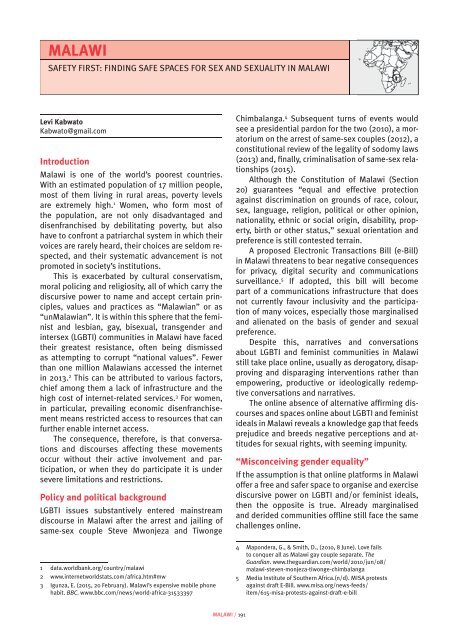Global Information Society Watch 2015
gw2015-full-report
gw2015-full-report
You also want an ePaper? Increase the reach of your titles
YUMPU automatically turns print PDFs into web optimized ePapers that Google loves.
mALAWI<br />
SAFETY FIRST: FINDING SAFE SPACES FOR SEX AND SEXUALITY IN MALAWI<br />
Levi Kabwato<br />
Kabwato@gmail.com<br />
Introduction<br />
Malawi is one of the world’s poorest countries.<br />
With an estimated population of 17 million people,<br />
most of them living in rural areas, poverty levels<br />
are extremely high. 1 Women, who form most of<br />
the population, are not only disadvantaged and<br />
disenfranchised by debilitating poverty, but also<br />
have to confront a patriarchal system in which their<br />
voices are rarely heard, their choices are seldom respected,<br />
and their systematic advancement is not<br />
promoted in society’s institutions.<br />
This is exacerbated by cultural conservatism,<br />
moral policing and religiosity, all of which carry the<br />
discursive power to name and accept certain principles,<br />
values and practices as “Malawian” or as<br />
“unMalawian”. It is within this sphere that the feminist<br />
and lesbian, gay, bisexual, transgender and<br />
intersex (LGBTI) communities in Malawi have faced<br />
their greatest resistance, often being dismissed<br />
as attempting to corrupt “national values”. Fewer<br />
than one million Malawians accessed the internet<br />
in 2013. 2 This can be attributed to various factors,<br />
chief among them a lack of infrastructure and the<br />
high cost of internet-related services. 3 For women,<br />
in particular, prevailing economic disenfranchisement<br />
means restricted access to resources that can<br />
further enable internet access.<br />
The consequence, therefore, is that conversations<br />
and discourses affecting these movements<br />
occur without their active involvement and participation,<br />
or when they do participate it is under<br />
severe limitations and restrictions.<br />
Policy and political background<br />
LGBTI issues substantively entered mainstream<br />
discourse in Malawi after the arrest and jailing of<br />
same-sex couple Steve Mwonjeza and Tiwonge<br />
1 data.worldbank.org/country/malawi<br />
2 www.internetworldstats.com/africa.htm#mw<br />
3 Igunza, E. (<strong>2015</strong>, 20 February). Malawi’s expensive mobile phone<br />
habit. BBC. www.bbc.com/news/world-africa-31533397<br />
Chimbalanga. 4 Subsequent turns of events would<br />
see a presidential pardon for the two (2010), a moratorium<br />
on the arrest of same-sex couples (2012), a<br />
constitutional review of the legality of sodomy laws<br />
(2013) and, finally, criminalisation of same-sex relationships<br />
(<strong>2015</strong>).<br />
Although the Constitution of Malawi (Section<br />
20) guarantees “equal and effective protection<br />
against discrimination on grounds of race, colour,<br />
sex, language, religion, political or other opinion,<br />
nationality, ethnic or social origin, disability, property,<br />
birth or other status,” sexual orientation and<br />
preference is still contested terrain.<br />
A proposed Electronic Transactions Bill (e-Bill)<br />
in Malawi threatens to bear negative consequences<br />
for privacy, digital security and communications<br />
surveillance. 5 If adopted, this bill will become<br />
part of a communications infrastructure that does<br />
not currently favour inclusivity and the participation<br />
of many voices, especially those marginalised<br />
and alienated on the basis of gender and sexual<br />
preference.<br />
Despite this, narratives and conversations<br />
about LGBTI and feminist communities in Malawi<br />
still take place online, usually as derogatory, disapproving<br />
and disparaging interventions rather than<br />
empowering, productive or ideologically redemptive<br />
conversations and narratives.<br />
The online absence of alternative affirming discourses<br />
and spaces online about LGBTI and feminist<br />
ideals in Malawi reveals a knowledge gap that feeds<br />
prejudice and breeds negative perceptions and attitudes<br />
for sexual rights, with seeming impunity.<br />
“misconceiving gender equality”<br />
If the assumption is that online platforms in Malawi<br />
offer a free and safer space to organise and exercise<br />
discursive power on LGBTI and/or feminist ideals,<br />
then the opposite is true. Already marginalised<br />
and derided communities offline still face the same<br />
challenges online.<br />
4 Mapondera, G., & Smith, D., (2010, 8 June). Love fails<br />
to conquer all as Malawi gay couple separate. The<br />
Guardian. www.theguardian.com/world/2010/jun/08/<br />
malawi-steven-monjeza-tiwonge-chimbalanga<br />
5 Media Institute of Southern Africa.(n/d). MISA protests<br />
against draft E-Bill. www.misa.org/news-feeds/<br />
item/615-misa-protests-against-draft-e-bill<br />
MALAWI / 191


